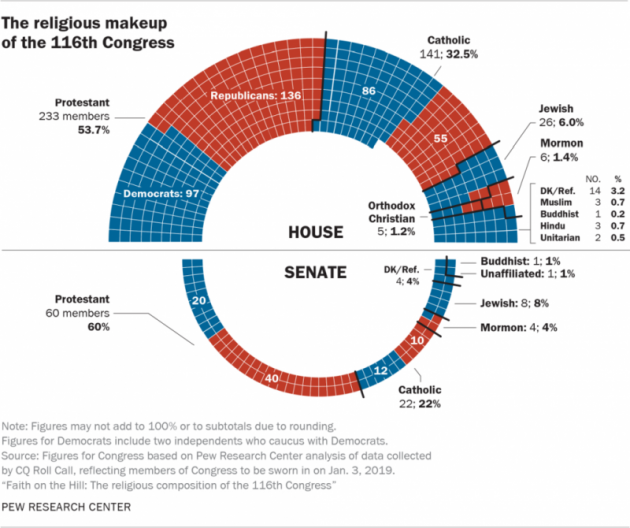Faith on the Hill - Religious composition of 116th Congress different to that of US population: Pew

The 116th U.S. Congress began proceedings on Jan 3 and includes the first two Muslim women to serve in the House of Representatives, and is, overall, slightly more religiously diverse than the prior Congress.
There has been a 3-percentage-point decline in the share of members of Congress who identify as Christian according to the Pew Research Center, with Christians still overrepresented in Congress.
In the 115th Congress, 91 percent of members were Christian, while in the 116th, 88 percent are Christian.
There are also four more Jewish members, one additional Muslim and one more Unitarian Universalist in the new Congress along with eight more members who decline to state their religious affiliation.
While the number of self-identified Christians in Congress has trickled downwards, Christians as a whole – and especially Protestants and Catholics – are still overrepresented in proportion to their share in the general public.
"Indeed, the religious makeup of the new, 116th Congress is very different from that of the United States population," finds Pew.
Within Protestantism, certain groups are particularly numerous in the new Congress, including Methodists, Anglicans/Episcopalians, Presbyterians and Lutherans.
Additionally, Protestants in the "unspecified/other" category make up just 5 percent of the U.S. public, but 15 percent of Congress.
By contrast, some other Protestant groups are underrepresented, including Pentecostals (5 percent of the U.S. public vs. 0.4 percent of Congress).
But by far the largest difference between the U.S. public and Congress is in the share who are unaffiliated with a religious group.
In the general public, 23 percent say they are atheist, agnostic or "nothing in particular."
In Congress, just one person, Democrat Senator Kyrsten Sinema of Arizona, who was recently elected after three terms in the House, says she is religiously unaffiliated, making the share of "nones" in Congress 0.2 percent.
When Sinema was sworn into the Senate on Jan. 3, she placed her left hand on an Arizona "lawbook" (to use Getty's terminology) instead of the Bible.
When asked about their religious affiliation, a growing number of members of Congress decline to specify (categorized as "don't know/refused").
This group – all Democrats – numbers 18, or 3 percent of Congress, up from 10 members (2 percent) in the 115th Congress.
Their reasons for this decision may vary. But one member in this category, Democratic Party's Representative Jared Huffman from California, announced in 2017 that he identifies as a humanist and says he is not sure God exists.
Huffman remains categorized as "don't know/refused" because he declined to state his religious identity in the CQ Roll Call questionnaire that was used to collect data for the report.
These are some of the findings from an analysis by Pew Research Center of CQ Roll Call data on the religious affiliations of members of Congress, gathered through questionnaires and follow-up phone calls to members' and candidates' offices.
The CQ questionnaire asks members what religious group, if any, they belong to.
It does not attempt to measure their religious beliefs or practices. The Pew Research Center analysis compares the religious affiliations of members of Congress with the Center's survey data on the U.S. public.
RELIGIOUS MAKEUP OF US CONGRESS
While the overall composition of the new Congress is similar to the previous one, around nine-in-ten members of each identified as Christian – the 116th Congress has 14 fewer Christians than the 115th, and 20 fewer Christians than the 114th Congress (2015-2016).
Anglicans/Episcopalians and Presbyterians faced the largest losses in the 116th Congress, which has nine fewer members in each of these groups compared with the previous Congress.
Methodists, Congregationalists, Restorationists and Christian Scientists also lost at least one seat; there are no longer any Christian Scientists in Congress.
Some Protestant denominational families now have more members in the new Congress, led by those in the "unspecified/other" category, which gained 16 seats, bringing the total number in this category to 80.
Among members of Congress, "unspecified/other" Protestants include those who say they are Christian, evangelical Christian, evangelical Protestant or Protestant, without specifying a denomination.
By contrast, nondenominational Protestants, who also gained two seats (going from eight to 10), are Christians who specifically describe themselves as nondenominational.
There are five fewer Catholics and three fewer Mormons in the new Congress.
There has been no change in the number of Orthodox Christians (five seats in both the new and prior Congress).
Among non-Christians, four additional Jewish members bring the Jewish share of the new Congress to 6 percent – three times the share of Jews in the general public (2 percent). Additionally, Unitarian Universalists gained one seat.
Muslim women join the new Congress for the first time – Michigan Democrat Rashida Tlaib and Minnesota Democrat Ilhan Omar.
They join Andre Carson, a Muslim Democrat from Indiana, in the House, bringing the number of Muslims in the new Congress to three.
That is one more than in the 115th Congress. (Omar represents Minnesota's 5th district – replacing Keith Ellison, who was the first Muslim elected to Congress in 2006.)
The number of Hindus in Congress is holding steady at three. All the Hindus from the 115th Congress are returning for the 116th: Rep. Ro Khanna, D-Calif.; Rep. Raja Krishnamoorthi, D-Ill.; and Rep. Tulsi Gabbard, D-Hawaii.
The number of Buddhists in Congress has dropped by one.
Colleen Hanabusa, D-Hawaii, decided to run for governor in Hawaii rather than seek re-election in the House. (She was ultimately unsuccessful in her gubernatorial campaign.)
Georgia Democratic Rep. Hank Johnson and Hawaii Democratic Sen. Mazie K. Hirono, both Buddhist members of the previous Congress, are returning for the 116th.
Sinema remains the sole member of Congress who publicly identifies as religiously unaffiliated, although there has been an increase of eight members in the "don't know/refused" category.
